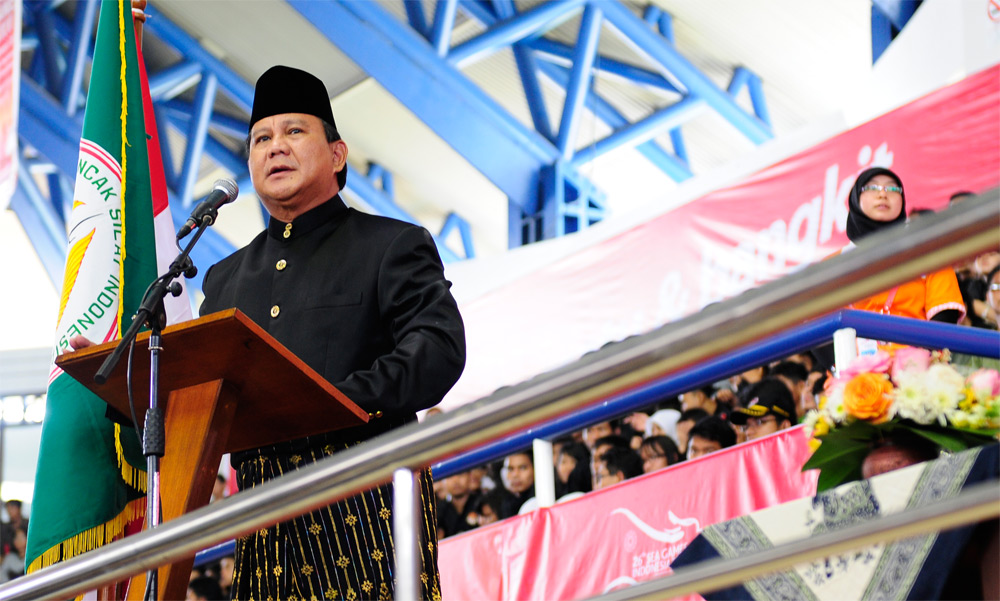
FILE: Prabowo Subianto opens the 2011 Pencak Silat SEA Games tournament held in Taman Mini, Jakarta. (Photo By Prabowo Subianto/Wikimedia Commons, CC BY-SA 3.0)
Indonesia’s president-elect, Prabowo Subianto, won February’s presidential election in a landslide victory of nearly 59% of the nationwide vote, more than double his nearest challenger.
But his party, Gerindra, fell far short of a majority in the parliamentary elections that took place at the same time. Gerindra was founded by Prabowo and its political fortunes are inseparable from his personal popularity. Yet, the party won just 14.8% of the seats in Indonesia’s House of Representatives (DPR).
And even the addition of all the parties that supported Probowo’s presidential candidacy only brings his numbers up to 48% of the seats in the assembly. This support is also not a given when it comes to legislation or approval of budgetary allocations.
So, is this a recipe for confrontation and deadlock after the new president and parliament are sworn into office in October?
What’s on Prabowo’s agenda?
Under Indonesia’s presidential system, Prabowo does not need a parliamentary majority to stay in office, but a troublesome parliament would be a major impediment for his government.
The parliament can be a check on executive power and the president’s fiscal initiatives, as well as a tool for contesting his legislative program. Prabowo will therefore need to build a coalition of parties to back him.
In the previous two elections he lost to Joko “Jokowi” Widodo in 2014 and 2019, he waged divisive campaigns. He presented himself as an ultra-nationalist strongman figure and mobilised extreme elements of Indonesia’s majority Islamic community. This approach was seen by many analysts as threatening the traditionally inclusive nature of Indonesian politics and society.
In this year’s election, however, Prabowo projected a more moderate image and largely committed himself to a continuation of Jokowi’s programs. He did not campaign on major new policy initiatives or structural reforms.
Jokowi’s programs have largely emphasised economic development, especially infrastructure, such as the construction of a new capital city, Nusantara, on Borneo.
Prabowo has also been a vocal advocate for the economic nationalist policies embraced by Jokowi. These include restrictions on the import of rice and other agricultural commodities to support local production and restrictions on the export of minerals to encourage domestic downstream processing.
Also in Prabowo’s favour: the composition of the new parliament is remarkably similarly to the one elected in 2019.
Former President Megawati Sukarnoputri’s party, Indonesian Democratic Party of Struggle (or PDI-P), will be the largest in the parliament to be inaugurated in October, with 110 seats. Next is the Golkar Party with 102 seats and then Prabowo’s Gerindra with 86.
None of the parties are opposed to the economic nationalist consensus that has long dominated Indonesian policy, including under Jokowi.
The only issues that generate real policy debate among the parties relate to sensitive questions over the state’s involvement in religious affairs, especially regarding the status of women in public and private life.
Defence could be contentious
Given these factors, is Prabowo’s lack of a parliamentary majority really a problem?
It can be. If Prabowo and his ministries do not manage their relationships with lawmakers the right way, it can be a source of irritation and even obstruction.
Party loyalties can be tenuous and legislators are notorious for being mostly concerned with pork-barrelling and patronage in their own constituencies. They often use their seats to advance their own personal business interests.
For example, Prabowo could encounter problems in one of the few areas where his administration may try to make a mark: defence policy and procurement. As a former military officer and defence minister, he appears committed to building up Indonesia’s military capability and asserting a leading role in regional security and the ASEAN bloc.
But when it comes to major defence budget allocations, his administration will need to satisfy powerful lawmakers who are linked to domestic contractors and others who benefit from military spending.
His controversial decision as defence minister to purchase outdated fighter jets from Qatar in 2023 was shelved after being criticised in parliament. His apparently off-the-cuff proposal for a Russia-Ukraine peace plan at a conference in June 2023 was criticised, as well.
Let the politicking begin
So, how will Prabowo manage the problem of the parliament?
He will almost certainly follow the same approach of his predecessors – tempt as many parties as possible into his tent by giving out attractive ministerial positions.
This is where the politicking for parliamentary positions and jockeying for cabinet posts are directly related. A party’s numbers in the parliament are its main bargaining chip for a place in cabinet. And the gifting of a ministerial post is the key to the president gaining support from rivals.
If experience is any guide, most parties will join his alliance if a ministry is on offer. The majority of parties did this under Susilo Bambang Yudhyono’s administration from 2004–14, as well as during Jokowi’s time in office. Prabowo benefited himself when Jokowi gave him the defence portfolio in 2019.
So far, no parties have come forward to publicly lobby for a post in Prabowo’s government, but this is undoubtedly part of the game of playing hard-to-get.
It is possible that Megawati’s party, PDI-P, may stay out of the cabinet and attempt to lead a parliamentary opposition. She likely still feels jilted by Jokowi, a former member of PDI-P, after he decided to support Prabowo instead of his own party’s presidential candidate during the campaign.
But other parties are likely to be receptive to cabinet posts. While it is true that a healthy legislature requires a healthy opposition, most Indonesian parties are more attracted by a share of the spoils of government than they are by the notion of keeping government accountable in opposition.
So, from now until the October inauguration, we will see a flurry of backroom meetings, flirtations and negotiations between Prabowo and the leaders of the parties to patch together a cabinet. Then, for Prabowo, comes the even harder task of trying to govern with such an unwieldy coalition, while maintaining some semblance of policy coherence and coordination.![]()
![]()
Stephen Sherlock, Visiting Fellow, Department of Political and Social Change, Coral Bell School of Asia Pacific Affairs, Australian National University
This article is republished from The Conversation under a Creative Commons license. Read the original article.





















